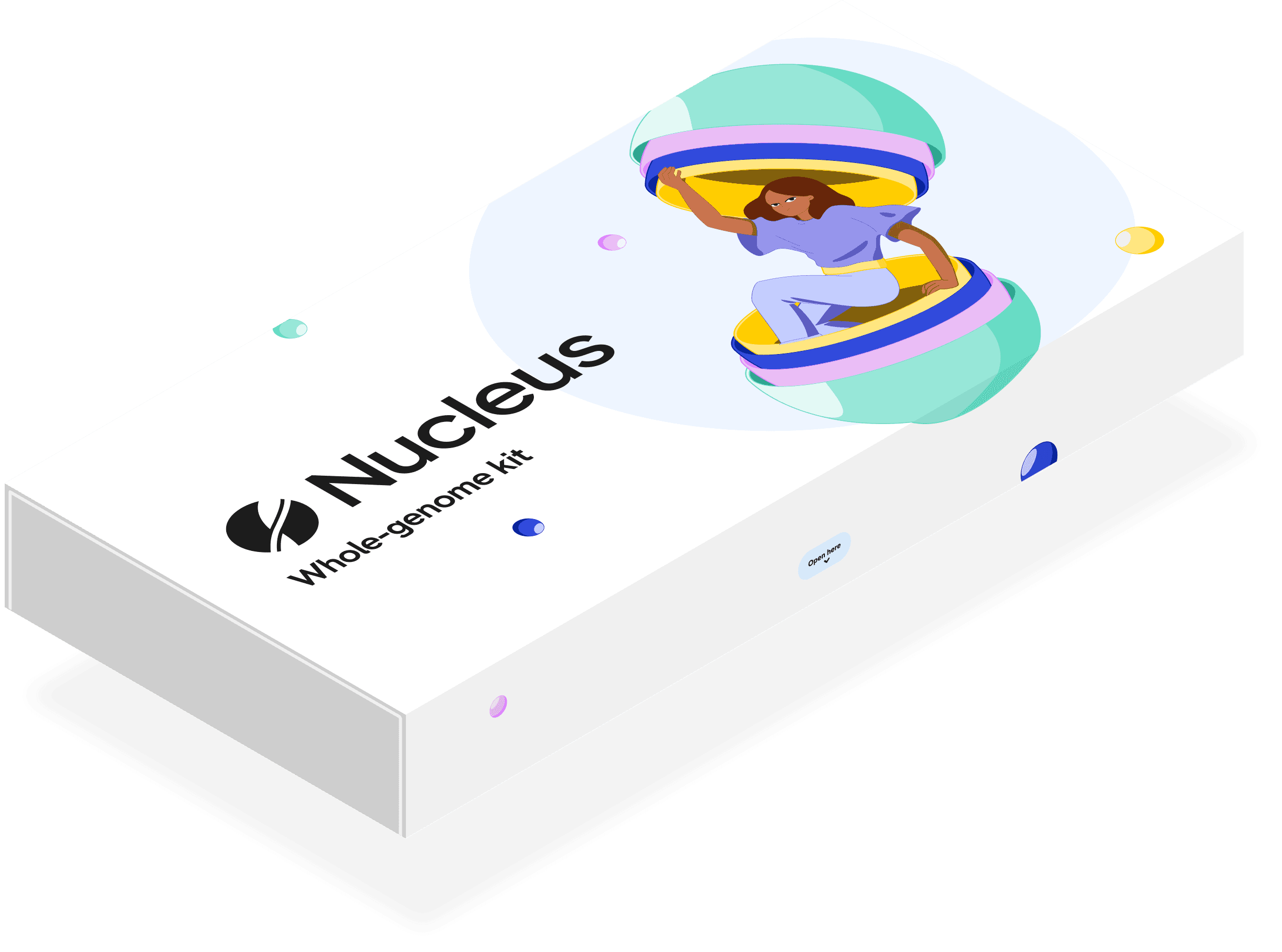Learn more about
Family planning

What's a carrier?
A “carrier” is someone who has a variant in a gene that's linked with a genetic condition, such as cystic fibrosis. Being a carrier usually doesn't affect their own health, but if a carrier has children with someone who is also a carrier for the same condition, there is a higher chance of passing the condition on to their children.
How common is being a carrier?
Being a carrier is common. In fact, most people are carriers for at least one genetic disease. However, because carriers usually only have one changed copy of their gene, they typically don't experience any symptoms—and are often unaware that they're carriers.
What does Nucleus test for?
Nucleus Family is a whole-genome DNA carrier screen that analyzes genes known to cause 800+ common genetic conditions. This information can help partners make more informed decisions about starting a family.
What does Nucleus NOT test for?
No test can look for every variant in every gene and Nucleus Family is no exception. Nucleus does not definitively rule out the possibility of you being a carrier for a genetic variant or your future kids developing a genetic condition.
How does the science work?
The human genome has about 20,000 genes. Typically, humans have two copies of each gene—one from their biological mother and one from their biological father. When two people have a baby together, each partner will pass down only one of their two copies. The copy that gets passed down is random each time they have a child.
Sometimes, the genes passed down from parent to child can have variants. Variants can range from small changes in a single DNA building block (called a nucleotide) to larger alterations such as insertions, deletions, or rearrangements of DNA. Some genetic variants have no effect on a person’s health, while others can increase the risk of certain diseases or lead to specific genetic disorders. For example, delta508 is a common variant in the CFTR gene that can lead to cystic fibrosis.
In the case of cystic fibrosis, a child typically needs variants in both copies of their CFTR gene in order to develop cystic fibrosis. This typically happens when both parents are carriers for a cystic fibrosis variant. If a child has a variant in only only one copy of their CFTR gene, then they won't have cystic fibrosis—but they'll be a carrier for it.
What can you do?
Partners who learn their kids could be at higher risk for a genetic condition can use this information in several ways:
Genetic Counseling
A genetic counselor can explain what results mean, discuss how likely it is for children to inherit a condition, and outline medical and family-planning choices.
Prenatal Testing
Prenatal tests can determine whether a fetus is likely to have the disease or not.
In Vitro Fertilization (IVF) with Preimplantation Genetic Testing (PGT)
IVF allows doctors to test embryos for the specific genetic condition before implantation to reduce or eliminate the chance of passing that variant on.
Adoption
Adoption is an option to avoid genetic risks if the possibility of having a child with a serious condition is a major concern.
Do nothing
Some people find peace of mind by choosing to have kids anyways. Each family’s situation is different, and we highly recommend talking with healthcare providers, including genetic counselors and fertility specialists, to determine which path aligns with personal values, health considerations, and life goals.
Additional testing
Before starting a family, many parents choose to undergo a variety of tests and screenings to help ensure the health of their future children. Here are some examples:
Infectious Disease Screening
What it checks: Conditions like HIV, hepatitis B and C, syphilis, and other sexually transmitted infections (STIs).
Why it matters: Early identification and treatment can protect both parents and reduce the risk of passing infections to the baby.
Hormone and Fertility Tests
What it checks: Hormone levels (e.g., thyroid, reproductive hormones like AMH for ovarian reserve or FSH/LH for ovulation), semen analysis for male partners.
Why it matters: Helps detect issues that may affect conception or a healthy pregnancy.
Blood Type and Rhesus (Rh) Factor
What it checks: Whether a parent is Rh-positive or Rh-negative.
Why it matters: Incompatibility between the mother and fetus’s blood type (Rh factor) can lead to complications like hemolytic disease of the newborn. Treatment (Rh immunoglobulin) is available.
Nutritional and Lifestyle Assessments
What it checks: Levels of important nutrients (e.g., folic acid, iron, vitamin D), overall health status, and lifestyle factors such as smoking, alcohol use, or diet.
Why it matters: Optimizing nutrition and health habits before pregnancy can support a healthier pregnancy and reduce risks of complications.
Family Health History Review
What it checks: Family history of chronic illnesses or genetic disorders, including congenital heart disease, cancers, and neurological conditions.
Why it matters: Helps healthcare providers identify patterns that might increase risk for future children, guiding more specific or targeted tests.
Preimplantation Genetic Testing (PGT) with IVF
What it checks: Embryos can be tested before implantation for certain genetic or chromosomal conditions, such as translocations or specific gene mutations.
Why it matters: Allows parents to choose embryos without those specific conditions.
By working with healthcare professionals such as obstetricians, fertility specialists, and genetic counselors, prospective parents can create a personalized plan that addresses their unique health background and goals, ultimately helping to optimize the health and well-being of their future children.






